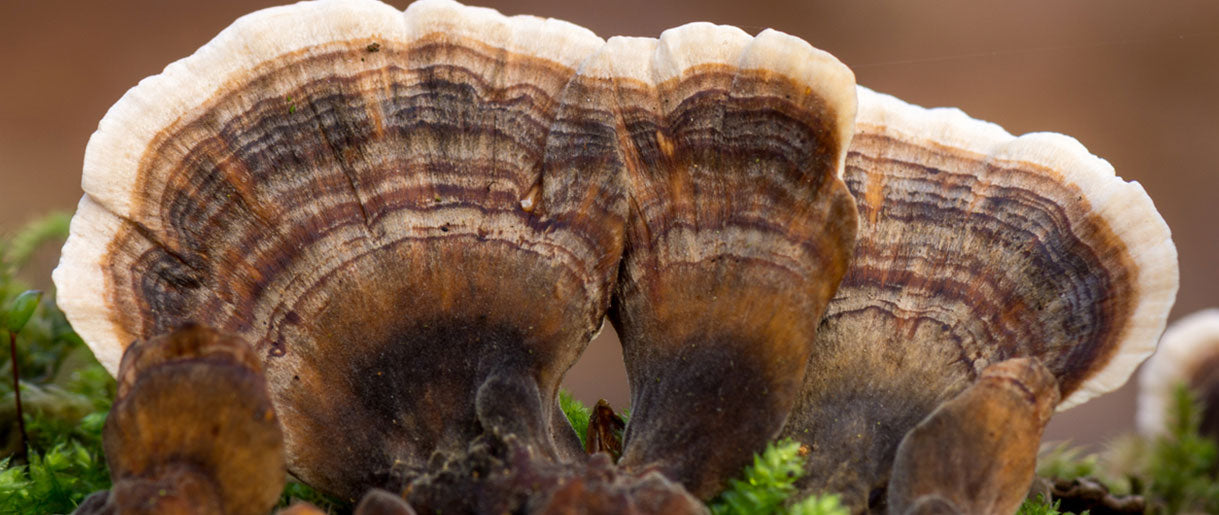Despite the intriguing name and widespread interest in psychedelic fungi, the Turkey Tail mushroom (Trametes versicolor) is not a psychedelic mushroom. It does not contain psilocybin or any other hallucinogenic compounds typically found in psychedelic mushroom species.
Instead, Turkey Tail mushrooms are highly regarded for their medicinal properties, particularly their immune-boosting benefits. They have been used for centuries in traditional medicine and are currently being studied for their potential anti-cancer properties.
Though many mushrooms have health benefits or psychedelic properties, it's essential to identify and understand each species before consumption properly. For this reason, this article aims to delve deeper into the mystery and allure of Turkey Tail mushrooms.
We'll explore their history, their uses in traditional medicine, and the latest scientific research on their health benefits. We will also address the confusion and myths about the Turkey Tail mushroom's psychedelic properties and provide clear, evidence-based facts.
Demystifying the Turkey Tail Mushroom: A Closer Look

The Turkey Tail mushroom, scientifically known as Trametes versicolor, Coriolus versicolor, or Polyporus versicolor, is one of the most recognizable medicinal mushrooms on the planet.
Aptly named for its colorful stripes resembling a turkey's tail, it belongs to the group of functional mushrooms prized for their health-enhancing properties. The term 'versicolor' in all its scientific names is a testament to this remarkable fungus's rich, varied colors.
A Kaleidoscope of Colors: The Visual Appeal of Turkey Tail Mushrooms
The beauty of Turkey Tail mushrooms lies in their unique aesthetic appeal. Their fruiting body features various colors, from deep browns and tans to softer blue, gray, and even purple hues.
The concentric circles of varying shades create a pattern reminiscent of the fanned feathers of its namesake—the turkey. This stunning visual attribute, combined with the mushroom's medicinal properties, sets the Turkey Tail mushroom apart as an iconic representative of functional mushrooms.
Humble Abode: Where Turkey Tail Mushrooms Grow
Turkey Tail mushrooms grow in various habitats, favoring hardwood forests. Actual Turkey Tail mushrooms thrive on decaying logs and stumps, their role as decomposers making them an integral part of the forest ecosystem.
These polypore fungi prefer cool, damp conditions and can be found across many continents, including North America, Europe, and Asia. This wide distribution has made Turkey Tail mushrooms one of the most common and easily identifiable medicinal mushrooms.
Psychedelic Mushrooms: A Journey Through History

Psychedelic fungi, rich in bioactive compounds and known for their psychoactive effects, have been utilized by various cultures throughout history. This section aims to shed light on the ancient uses and the significant influence these fascinating fungi have had on different societies.
The Ancient Rituals: Psychedelic Fungi in Early Cultures
Psilocybin mushrooms, often called 'magic mushrooms,' have been a part of human culture for thousands of years. Archaeological evidence and ancient art suggest that these mushrooms were used in religious and shamanic rituals, with their psychoactive compound inducing psychedelic effects seen as spiritual or mystical experiences. From the Saharan tribes in Africa to the indigenous cultures of Central and South America, these potent fungi were often embedded in their religious and healing practices.
The Cultural Impact: Psychedelic Mushrooms Across the Globe
The influence of psychedelic fungi has reached far and wide. In Mesoamerican cultures, they were considered sacred and were used for divination and healing. The famous 'mushroom stones' found in Guatemala, dating back to 1000-500 B.C., testify to their significant role in ancient Mayan and Aztec societies.
In Siberia and certain parts of Asia, different types of psychoactive mushrooms were used by shamans to reach altered states of consciousness. In European history, though less documented, there are theories suggesting the possible use of these mushrooms in ancient Greek and Celtic rituals.
From Ancient Traditions to Modern Science
The traditional uses of these mushrooms, steeped in cultural significance, have paved the way for modern science to investigate their potential benefits and applications. Today, the bioactive compounds in these fungi are being studied for their potential in mental health treatments, such as depression and PTSD.
The Psychedelic Properties of Mushrooms: A Deep Dive

The psychedelic properties of mushrooms are a fascinating subject that combines biology, chemistry, and psychopharmacology. Of course, not all mushrooms possess these intriguing qualities, but a select few species have evolved to produce unique compounds that profoundly alter human perception and consciousness.
Psychedelic Mushrooms: A Unique Ensemble of Species
While there are over 10,000 known types of mushrooms, only about 200 species are known to have psychedelic properties. These psychedelic fungi belong primarily to the Psilocybe genus. This group of fungi produces a range of psychoactive compounds that can induce changes in mood, perception, thought, and experiences of reality.
Interesting Read: Is Lion's Mane mushroom psychedelic?
Psilocybin: The Key to the Door of Perception
Psilocybin is the primary active compound in most psychedelic fungi. It's a naturally occurring psychedelic prodrug metabolized into an active drug after entering the body. In this case, psilocybin is converted into psilocin, which interacts with the serotonin receptors in the brain, leading to a range of psychedelic effects.
These effects can include euphoria, visual and mental hallucinations, changes in perception, a distorted sense of time, and spiritual experiences. The intensity and duration of these experiences depend on various factors such as dosage, individual physiology, mindset, and environmental setting.
Interesting Read: Is Reishi psychedelic?
Beyond Psilocybin: Other Psychoactive Compounds
While psilocybin is the most well-known, other psychoactive compounds are present in psychedelic fungi, such as baeocystin and norbaeocystin. These compounds are believed to contribute to the overall psychedelic experience, although more research is needed to fully understand their specific roles and effects.
Are Turkey Tail Mushrooms Psychedelic? A Myth Debunked

The name "Turkey Tail mushroom psychedelic" has been tossed around online, leading to a handful of misconceptions about the true nature of this fascinating fungus. So let's dive deeper to dispel these myths and draw accurate comparisons between Turkey Tail mushrooms and their psychedelic counterparts.
The Misunderstanding: Turkey Tail Fungus Psychedelic?
A common myth is that Turkey Tail mushrooms are psychedelic. This misunderstanding likely arises from the general intrigue around psychedelic fungi and the unique name 'Turkey Tail.' However, contrary to what the term "Turkey Tail mushroom psychedelic" might suggest, Turkey Tail mushrooms are not psychedelic.
They do not contain psilocybin or other psychoactive compounds found in psilocybin mushrooms. Hence they do not induce a psychedelic experience. Instead, Turkey Tail mushrooms have a long history of use as a medicinal mushroom, valued for their immune-boosting benefits.
Turkey Tail vs. Psychedelic Mushrooms: A Distinctive Comparison
While Turkey Tail mushrooms and psychedelic fungi belong to the larger fungi kingdom, they are fundamentally different.
Psychedelic fungi, such as those in the Psilocybe genus, produce psychoactive compounds, like psilocybin, which can alter perception, mood, and cognitive processes. On the other hand, Turkey Tail mushrooms are a type of lignicolous fungus, Trametes versicolor, which commonly grows on dead or decaying logs and dying trees, particularly hardwood trees.
Turkey Tail mushroom supplements, whether in the form of turkey tail extract or turkey tail powder, are packed with beneficial compounds. These include polysaccharide peptide (PSP), polysaccharide K (PSK), and beta-glucans, which are known to support the immune system. So instead of inducing a psychedelic experience, consuming Turkey Tail mushroom supplements, or using turkey tail mushroom extract in other forms, could potentially support your immune health.
The Medicinal Value of Turkey Tail Mushrooms: Unraveling the Potential

Turkey Tail mushrooms have attracted significant attention in the scientific community and wellness enthusiasts for their purported health and wellness benefits. These beneficial effects range from immune support to gut health improvement, backed by increasing scientific evidence. So let's delve deeper into the medicinal value benefits of Turkey Tail mushrooms.
1. Immune Support: The Power of Turkey Tail Mushrooms
A critical benefit of Turkey Tail mushrooms revolves around immune support. These fungi are rich in compounds like polysaccharides, polysaccharide peptides, and beta-glucans, which have been found(1) to support immune cells, including white blood cells.
These components are believed to modulate the immune system, assisting the body's natural defense mechanisms. This makes Turkey Tail mushrooms a potential ally for those seeking to strengthen their immune systems.
2. Optimizing Gut Health with Turkey Tail
Another significant health and wellness benefit of Turkey Tail mushrooms is their positive impact on the gut. Turkey Tail's gut health benefits result from its prebiotic effects, meaning they nourish the beneficial bacteria in your gut.
This can lead to a more balanced gut microbiome, vital for overall health. Improved gut health can, in turn, lead to an improved quality of life, given the critical role of the gut in everything from digestion to mood regulation.
3. Turkey Tail Mushrooms and Cancer: Current Research and Findings
Of particular interest is the potential role of Turkey Tail mushrooms in supporting conventional cancer treatments. Some studies(2) have suggested that Turkey Tail extract could help alleviate some of the adverse effects experienced by cancer patients, particularly those undergoing chemotherapy.
One of the most well-known studies(3) involved breast cancer patients, where consumption of Turkey Tail mushroom extract was linked to improved immune status. While more research is needed, initial findings offer hope for the potential benefits of Turkey Tail mushrooms for cancer patients.
A Note on Safety: Are There Adverse Effects When Using Turkey Tail Mushroom?
As with any supplement, awareness of potential adverse effects is essential. Generally, Turkey Tail mushrooms are considered safe for most people.
However, some may experience digestive upset, particularly when incorporating Turkey Tail mushroom extract or supplements into their regimen for the first time. Therefore, starting with a smaller dose is always wise to see how your body reacts and consult a healthcare provider if any adverse effects persist.
Safe and Legal Considerations of Psychedelic Mushrooms

While there's a surge of interest in the potential therapeutic benefits of psychedelic fungi, it's essential to take a balanced approach. This section will shed light on the legal status of psychedelic fungi globally and explore potential risks and safety considerations associated with their use.
Global Legality of Psychedelic Mushrooms: A Mixed Bag
The legal status of psychedelics varies significantly around the world. In some regions, they're considered controlled substances and are strictly regulated or illegal. Conversely, there are a few places, like certain states in the U.S. and some countries, where the laws around psychedelics have been relaxed or decriminalized for therapeutic or personal use.
These changing attitudes toward psychedelic mushrooms are often driven by research studies indicating their potential therapeutic benefits, particularly in mental health. However, it's crucial to know and respect the laws in your local area before considering their use.
Potential Risks and Safety Considerations: Tread Carefully
As with any substance that alters cognitive function, there are potential risks and safety considerations when using psychedelic mushrooms. One of the main concerns revolves around reported side effects, which can range from physical symptoms like nausea, increased heart rate, and changes in blood pressure to psychological effects like anxiety, paranoia, and confusion.
Moreover, there can be irreversible side effects when psychedelic mushrooms are used in inappropriate settings or without adequate preparation and support. Some people may also have adverse reactions, including severe psychological distress or a potential mushroom allergy.
Therefore, it's crucial to be aware of these risks and proceed with caution. While some research indicates potential benefits, seeking professional advice before experimenting with substances that alter cognitive function is always recommended.
FAQs About "Is Turkey Tail Mushroom Psychedelic?"
How Long Does It Take For Turkey Tail Mushroom To Work?
The effects of Turkey Tail mushroom, particularly when taken as a dietary supplement, can vary significantly between individuals. They are influenced by several factors, including individual body chemistry, the specific issue being addressed, dosage, and the quality of the supplement.
For general wellness and immune support, some people may notice changes in their health within a few weeks of regular Turkey Tail mushroom supplementation. However, for more specific therapeutic applications, like support during cancer treatment, it may take several months of consistent use to notice significant effects.
Does Turkey Tail Give You Energy?
While Turkey Tail mushroom isn't typically categorized as an energy-boosting supplement in the way that certain herbs or other types of mushrooms (like Cordyceps) are, it can contribute to overall wellness, which might indirectly influence energy levels.
Turkey Tail mushroom is highly regarded for its immune-boosting properties due to compounds like polysaccharides and beta-glucans. Turkey Tail can help the body operate more efficiently by supporting immune health, potentially leading to increased energy levels.
Furthermore, Turkey Tail mushroom may support gut health due to their prebiotic properties. A healthy gut microbiome is essential for proper nutrient absorption and digestion, which can also contribute to overall energy levels.
Key Takeaways
Despite being rich in health-promoting compounds, the Turkey Tail mushroom is not a psychedelic mushroom. Instead, it's a medicinal fungus known scientifically as Trametes versicolor, with a proven track record in boosting immune function, supporting the gut, and showing promising adjunctive benefits in cancer treatment.
Psychedelic mushrooms have held sacred roles in various cultures and are now being rediscovered by modern science for their potential therapeutic applications. From mental health treatments to potential breakthroughs in understanding consciousness, psychedelic mushrooms offer promising horizons for exploration.
Despite this promise, it's crucial to approach the world of psychedelic mushrooms responsibly. Their use comes with risks and legal implications, and their potential effects should not be taken lightly. Therefore, it's essential to ensure safe, informed, and respectful use, guided by professional advice and emerging scientific evidence.
We hope you found this exploration into the world of Turkey Tail mushrooms and the larger field of psychedelia informative and engaging. We would love to hear from you! What are your thoughts on the potential therapeutic benefits of medicinal and psychedelic mushrooms? Have you had any personal experiences with Turkey Tail or other mushrooms? Do you have any questions or topics you'd like us to delve into in future articles? Please feel free to leave a comment below. Your insights and curiosity fuel our exploration into this wonderful world of fungi.
References
- Immunomodulatory Properties of Coriolus versicolor: The Role of Polysaccharopeptide, (1)https://www.ncbi.nlm.nih.gov/pmc/articles/PMC5592279/
- Polysaccharide K and Coriolus versicolor extracts for lung cancer: a systematic review, (2)https://pubmed.ncbi.nlm.nih.gov/25784670/
- Phase 1 Clinical Trial of Trametes versicolor in Women with Breast Cancer, (3)https://www.hindawi.com/journals/isrn/2012/251632/










Let Us Know Your Comments